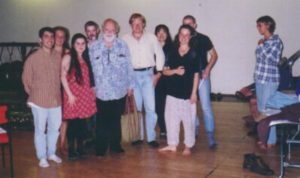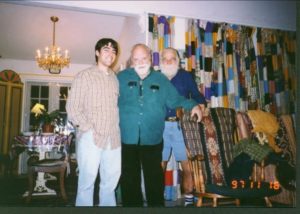 When I first became a curator at the Center for New Music, I reached out to some of my favorite Bay Area artists and asked them: “What’s one project you’ve always wanted to do, but have never had the opportunity to realize?”
When I first became a curator at the Center for New Music, I reached out to some of my favorite Bay Area artists and asked them: “What’s one project you’ve always wanted to do, but have never had the opportunity to realize?”
Among the first to respond was composer Edward Schocker. I knew Edward as an instrument builder and the artistic director of the Thingamajigs organization, but was unfamiliar with his deep interest in alternate tuning systems—that is, musical scales that do not conform to the evenly spaced “equal tempered” scale we are most familiar with by way of the piano and other modern instruments. Edward’s idea gave the concept an interesting twist: to have two composers collaborate with a Baroque ensemble to create new music for old instruments in historical tuning systems. It was strange, engaging, and delightfully anachronistic—I was smitten, and ready to help see this idea made real.
A few months, one grant, and countless emails later, I’m thrilled to have this project, now called Endangered Temperaments, come to full fruition at the Center for New Music on November 28. The show will feature early music group the Bertamo Trio performing two new works written especially for them by Schocker and another local composer-hero of mine, Dennis Aman. In addition to these commissioned works, the group will perform a selection of Baroque works in a historical tuning system widely used during the era: meantone temperament. The result will be a rare glimpse into a sound world that is seldom heard by 21st-Century ears.
How does one develop an interest in a musical system that is so foreign to our modern musical life, much less go about writing a work in that system? Edward discusses how he developed a passion for alternate tuning systems, and explains his process for this new commission.
 I’ve become interested in writing music in alternate tuning systems since first working with Lou Harrison at Dartington College (right) in England. I took a summer class of his called History of Tunings and Temperaments and it really opened my ears to the unique characteristics and compositional possibilities of tunings outside of Equal Temperament. In the class we learned about historical tunings from the Early Greeks through more complex tunings from 20th Century composers such as Harry Partch and LaMonte Young. We also learned about non-Western tunings from Java, Bali, Japan and Korea. From learning and listening to all these amazing tunings and thinking about how quickly Equal Temperament became the dominant tuning system of Western Society, I soon realized that there was still so much that hasn’t been explored yet. The problem is that there are not many ensembles that understand and play in alternate tunings. Although I’ve written many pieces in alternate tunings, they were usually for non-Western instruments, so I really jumped on the opportunity to write music for the Bertamo Trio for our upcoming Endangered Temperaments concert at Center for New Music.
I’ve become interested in writing music in alternate tuning systems since first working with Lou Harrison at Dartington College (right) in England. I took a summer class of his called History of Tunings and Temperaments and it really opened my ears to the unique characteristics and compositional possibilities of tunings outside of Equal Temperament. In the class we learned about historical tunings from the Early Greeks through more complex tunings from 20th Century composers such as Harry Partch and LaMonte Young. We also learned about non-Western tunings from Java, Bali, Japan and Korea. From learning and listening to all these amazing tunings and thinking about how quickly Equal Temperament became the dominant tuning system of Western Society, I soon realized that there was still so much that hasn’t been explored yet. The problem is that there are not many ensembles that understand and play in alternate tunings. Although I’ve written many pieces in alternate tunings, they were usually for non-Western instruments, so I really jumped on the opportunity to write music for the Bertamo Trio for our upcoming Endangered Temperaments concert at Center for New Music.
At our first meeting we decided to use Meantone Temperament as our “tuning du jour” for this project. Many of us Music Majors might remember meantone temperament from our music history classes as the tuning that came into practice (replacing Pythagorean-based tuning) in the late 15th Century and through the 18th Century. The main benefit of this tuning is that the Thirds and Sixths are very purely tuned. Coincidentally (or not) Western music was favoring Tertian Harmony over Pythagorean Harmony (music in fifths and fourths). I never wrote music before in meantone and honestly didn’t know the temperament that well, so I listened to recordings of harpsichord and organ music that was tuned in the temperament. But what helped most was having the players of the Bertamo Trio play works live for me at their rehearsal space so I could attune my ear to the harmonic qualities.
When it was time to actually compose in Meantone, I relied on a wonderful program called Little Miss Scale Oven (recommended to me years ago by composer, Ellen Fullman). LMSO allows you to retune most electronic keyboards to virtually any tuning you can think of. It also has a huge bank of Historical and World tunings that are pre-programed in the package. Luckily ⅓-tone Meantone Temperament was already in the program so I just chose the root note of the tuning and was able to work from there. I became very interested in utilizing harmony in Sevenths and Seconds with this tuning and started to write down drafts for a new work.
To hear the Bertamo Trio play Schocker’s finished work, a new work by Dennis Aman, and a selection of Baroque works all filtered through the fascinating and rarely-heard world of meantone temperament, be sure to check out Endangered Temperaments at the Center for New Music on November 28.
